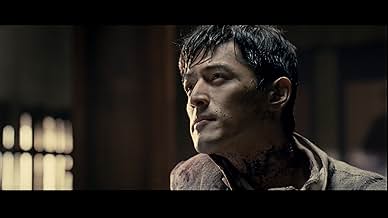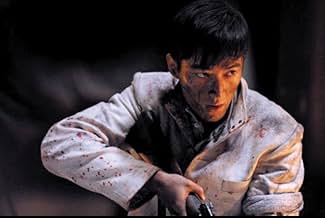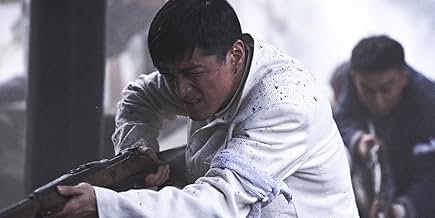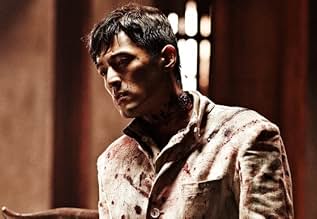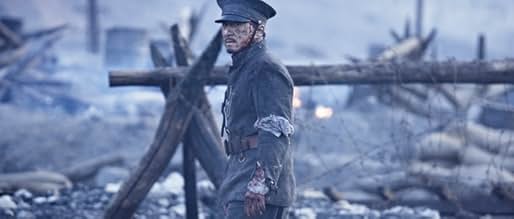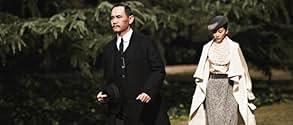CALIFICACIÓN DE IMDb
5.7/10
6.7 k
TU CALIFICACIÓN
Agrega una trama en tu idiomaA historical drama based on the founding of the Republic of China when nationalist forces led by Sun Yat-sen overthrew the Qing Dynasty.A historical drama based on the founding of the Republic of China when nationalist forces led by Sun Yat-sen overthrew the Qing Dynasty.A historical drama based on the founding of the Republic of China when nationalist forces led by Sun Yat-sen overthrew the Qing Dynasty.
- Premios
- 6 premios ganados y 7 nominaciones en total
Bingbing Li
- Xu Zonghan
- (as Bingbing Lee)
Jaycee Cho-Ming Chan
- Zhang Zhenwu
- (as Jaycee Chan)
Yu-Hang To
- Xiong Bingkun
- (as Dennis To)
Duobujie
- Feng Guozhang
- (as Duobuji)
Opiniones destacadas
Jackie Chan celebrates the milestone of the 100th film in his career with the 100th anniversary of the Xinhai Revolution, significant for ending the reign of the Qing Dynasty and ushering in a new era with the founding of the Republic of China. Simply titled '1911', the expensive historical epic sees Chan taking on the role of General Huang Xing, who was leader Dr Sun Yat-Sen's deputy and commander of the revolutionaries in several cities across South China.
Besides starring in the film, Chan also bankrolled the US$30mil drama and serves as 'general director' alongside TV director Zhang Qi- so let it be known that this is also Jackie's passion project. Nonetheless, good intentions do not a good film make- and '1911' is an excellent case in point. Meticulously researched and assembled to make it as authentic a depiction of history as possible, it is nonetheless underwhelming and lacking in heart, spirit and most of all passion. It is also less a film than a history lesson, and far less compelling than its peers 'Founding of a Republic' and 'Beginning of the Great Revival'.
Yes, it is ostensibly modelled against the latter two similarly big- budget historical pictures that have taken a momentous chapter in China's history and turned it into crowd-pleasing blockbuster entertainment with a who's-who list of actors in roles both large and small. But even with 'Founding's' screenwriters Wang Xingdong and Chen Baoguang, '1911' lacks the finesse of both its genre predecessors, attempting too strenuously to squeeze as many characters and plot lines as possible into its two-hour running time.
We have no qualms with the film's method of introducing its characters with on screen captions, but there are just too many in here to even matter. Indeed, the sheer number of them means that some like Jaycee Chan's Zhang Zhenwu, Yu Shaoqun's Wang Jingwei, or Dennis To's Xiong Bingkun have less than a minute of screen time, and disappear as quickly from their audience's mind. The objective of honouring these martyrs and their respective contributions to the revolution is admirable, but some judiciousness should very well have been exercised to ensure that those given mention do make a difference in the film too.
The consequence of portraying so many characters at once is also that the first half of the film feels extremely haphazard, fast-forwarding from one event to another with little continuity. In fact, this film probably takes the crown for being most heavily reliant on text throughout its duration to explain each and every sequence, and the ill- conceived technique results in a film that feels oddly like watching a history textbook unfold before one's eyes. It doesn't help too that editor Yang Hongyu likes to interrupt scenes just as they are building up with flashbacks or parallel yet unrelated events, effectively preventing the audience from engaging with the characters within.
And even though history is supposed to be an objective and dispassionate exercise, that is no excuse for the lack of any true emotion in the film. Busy juggling the mammoth cast and characters, neither Jackie Chan nor Zhang Qi seem to have paid much attention to the development of the key roles- Huang Xing, Xu Zonghan and even Sun Yat-Sen. Their definition here is essentially one-note- whether the wise intellectual (Sun) or the brave military commander (Huang) or the quiet yet strong-willed wife (Xu)- and you're not likely to feel any differently for any of the characters before and after the film. The only interesting character amongst them all is General Yuan Shikai (Sun Chun), depicted as shrewd and cunning in brokering the abdication of the feudal throne.
In truth, for all its promise of being a gritty war movie a la 'Saving Private Ryan', it is the political struggles in the last days of the Qing dynasty between the provisional president Sun Yat-Sen and Yuan Shikai that proves the most intriguing. Crammed into the last half hour of the film, this particular theme emphasises the challenge of instituting a new political regime which would replace a system more than 2000 years old. In contrast, the battle scenes lack intensity or any genuine thrills for that matter, often drowning in melodramatic music to demonstrate the heroism of the outnumbered and outgunned revolutionary forces against the Qing's military might.
And we suspect that Jackie Chan fans may be most let down by that, since we do expect much better from the veteran actor who's given us some of the most thrilling action movies in the 80s and 90s. Instead, Chan spends most of the time in the film looking old and aggrieved, with only a brief fight between Chan and three men coming close to the old Jackie we've grown to love. What's perhaps even more perplexing is that while Chan gets top billing, his role as Huang Xing is overshadowed by Winston Chao's Sun Yat-Sen and Sun Chun's Yuan Shikai- not simply because both Chao and Chun are better dramatic actors, but also because there is more screen time devoted to both.
Precisely because we are huge fans of the star, it pains us to say that Jackie Chan's 100th movie fails to live up to its expectations as a milestone film in his career or as a tribute to a significant event in modern China's history. Better suited as a TV movie on the History Channel than a lavish blockbuster epic, '1911' could be useful as educational material for those looking for an introduction to the founding of the republic- anyone else will likely be disappointed.
Besides starring in the film, Chan also bankrolled the US$30mil drama and serves as 'general director' alongside TV director Zhang Qi- so let it be known that this is also Jackie's passion project. Nonetheless, good intentions do not a good film make- and '1911' is an excellent case in point. Meticulously researched and assembled to make it as authentic a depiction of history as possible, it is nonetheless underwhelming and lacking in heart, spirit and most of all passion. It is also less a film than a history lesson, and far less compelling than its peers 'Founding of a Republic' and 'Beginning of the Great Revival'.
Yes, it is ostensibly modelled against the latter two similarly big- budget historical pictures that have taken a momentous chapter in China's history and turned it into crowd-pleasing blockbuster entertainment with a who's-who list of actors in roles both large and small. But even with 'Founding's' screenwriters Wang Xingdong and Chen Baoguang, '1911' lacks the finesse of both its genre predecessors, attempting too strenuously to squeeze as many characters and plot lines as possible into its two-hour running time.
We have no qualms with the film's method of introducing its characters with on screen captions, but there are just too many in here to even matter. Indeed, the sheer number of them means that some like Jaycee Chan's Zhang Zhenwu, Yu Shaoqun's Wang Jingwei, or Dennis To's Xiong Bingkun have less than a minute of screen time, and disappear as quickly from their audience's mind. The objective of honouring these martyrs and their respective contributions to the revolution is admirable, but some judiciousness should very well have been exercised to ensure that those given mention do make a difference in the film too.
The consequence of portraying so many characters at once is also that the first half of the film feels extremely haphazard, fast-forwarding from one event to another with little continuity. In fact, this film probably takes the crown for being most heavily reliant on text throughout its duration to explain each and every sequence, and the ill- conceived technique results in a film that feels oddly like watching a history textbook unfold before one's eyes. It doesn't help too that editor Yang Hongyu likes to interrupt scenes just as they are building up with flashbacks or parallel yet unrelated events, effectively preventing the audience from engaging with the characters within.
And even though history is supposed to be an objective and dispassionate exercise, that is no excuse for the lack of any true emotion in the film. Busy juggling the mammoth cast and characters, neither Jackie Chan nor Zhang Qi seem to have paid much attention to the development of the key roles- Huang Xing, Xu Zonghan and even Sun Yat-Sen. Their definition here is essentially one-note- whether the wise intellectual (Sun) or the brave military commander (Huang) or the quiet yet strong-willed wife (Xu)- and you're not likely to feel any differently for any of the characters before and after the film. The only interesting character amongst them all is General Yuan Shikai (Sun Chun), depicted as shrewd and cunning in brokering the abdication of the feudal throne.
In truth, for all its promise of being a gritty war movie a la 'Saving Private Ryan', it is the political struggles in the last days of the Qing dynasty between the provisional president Sun Yat-Sen and Yuan Shikai that proves the most intriguing. Crammed into the last half hour of the film, this particular theme emphasises the challenge of instituting a new political regime which would replace a system more than 2000 years old. In contrast, the battle scenes lack intensity or any genuine thrills for that matter, often drowning in melodramatic music to demonstrate the heroism of the outnumbered and outgunned revolutionary forces against the Qing's military might.
And we suspect that Jackie Chan fans may be most let down by that, since we do expect much better from the veteran actor who's given us some of the most thrilling action movies in the 80s and 90s. Instead, Chan spends most of the time in the film looking old and aggrieved, with only a brief fight between Chan and three men coming close to the old Jackie we've grown to love. What's perhaps even more perplexing is that while Chan gets top billing, his role as Huang Xing is overshadowed by Winston Chao's Sun Yat-Sen and Sun Chun's Yuan Shikai- not simply because both Chao and Chun are better dramatic actors, but also because there is more screen time devoted to both.
Precisely because we are huge fans of the star, it pains us to say that Jackie Chan's 100th movie fails to live up to its expectations as a milestone film in his career or as a tribute to a significant event in modern China's history. Better suited as a TV movie on the History Channel than a lavish blockbuster epic, '1911' could be useful as educational material for those looking for an introduction to the founding of the republic- anyone else will likely be disappointed.
- www.moviexclusive.com
Made to coincide with the centenary of the original event, 1911 REVOLUTION is a film that celebrates China's rise from the tyranny of the Qing dynasty into the modern era. It's an unashamedly patriotic movie, with clear-cut heroes and villains, and one that seeks to portray a politically complex situation in a massive country, on an international scale, in the space of two hours. The resultant film is an educational ride and historically interesting, but one that falls down when it comes to the basic facets of movie-making.
The film tries to be both a gutsy war film dominated by explosive battle sequences and a compelling political epic, featuring scenes from both sides involved in the revolution. Unfortunately, the editing is quite choppy and the battle scenes, although technically proficient, end up disappointing as you're left wanting more. Characterisation is virtually nil; Jackie bags the best role as the rebellious leader and has a few great action scenes, but everybody else feels like a player in a historical drama, never really coming to full life as they should. There are lots of familiar Chinese actors in various parts, but none of them make much of an impact here.
It's a shame, because there's a film with a similar focus, set five years previously, called BODYGUARDS & ASSASSINS, and I found it absolutely spellbinding. That movie manages to mix in the political intrigue and dramatic backdrop of the situation while at the same time telling a rollicking, action-packed storyline filled with melodrama and excitement. Yes, it was silly and over the top in places, but I'd rather that than this slightly stuffy and occasionally lifeless production that fails to engage the senses along with the intellect.
The film tries to be both a gutsy war film dominated by explosive battle sequences and a compelling political epic, featuring scenes from both sides involved in the revolution. Unfortunately, the editing is quite choppy and the battle scenes, although technically proficient, end up disappointing as you're left wanting more. Characterisation is virtually nil; Jackie bags the best role as the rebellious leader and has a few great action scenes, but everybody else feels like a player in a historical drama, never really coming to full life as they should. There are lots of familiar Chinese actors in various parts, but none of them make much of an impact here.
It's a shame, because there's a film with a similar focus, set five years previously, called BODYGUARDS & ASSASSINS, and I found it absolutely spellbinding. That movie manages to mix in the political intrigue and dramatic backdrop of the situation while at the same time telling a rollicking, action-packed storyline filled with melodrama and excitement. Yes, it was silly and over the top in places, but I'd rather that than this slightly stuffy and occasionally lifeless production that fails to engage the senses along with the intellect.
A historic film that doesn't work out well. Despite its rigor and historical interest, it's a not-so-smooth, confusing and uninteresting film. It seems to me that they had problems in the editing and it's a shame because it has an intense and modern scenography in the battle scenes, good interpretations.
It looks like a jigsaw puzzle where the pieces are forced to fit together and don't quite belong there, resulting in a confusing picture. Who knows if because of having so many directors...
It could have been a great historical epic, but it's not...
It looks like a jigsaw puzzle where the pieces are forced to fit together and don't quite belong there, resulting in a confusing picture. Who knows if because of having so many directors...
It could have been a great historical epic, but it's not...
I saw this film on Oct. 9th. 2011. It moves quite quickly at the beginning and there is a lot of war action portrayed in the failed attempts to overthrow the Qing Empire. Chartracters are all identified and that is the only part of the film that detracts from the viewing. The film is in Chinese and by the time you have read the subtitles the characters names are gone. The film is enjoyable if you know Chinese history of this period and if you don't it can be just a series of talking and action scenes and can be quite confusing. Sun yat-sen is the main character but Jackie Chan does get to be more than just an action figure. If you want to more about this period of Chinese this would be the movie to spur you on or illustrate better what was going on in China at this time. Yuan Shi-kai is one character who has appeared in a lot of historical films portraying this period and his actions are as always ones of greed and betrayal.
1911, also known as 1911 Revolution, is a China production which marks two special occasions: 1. To commemorate the 100th anniversary of Xinhai Revolution, which Dr Sun Yat Sen over throws the corrupted Qing Monarchy, marking the two thousand years of monarchy control of China to an end. 2. This is actor and director Jackie Chan's 100th movie. What audience can see from 1911 is not only about how China has come to its way today from the past, but also witness how Jackie Chan is taking a new approach in the types of movie he is making.
Generally 1911 revolves around the few main characters: Chan as Huang Xing, the commander who lead his army to overthrow the Qing Monarchy, Winston Chao as Dr Sun, Li Bing Bing as Xu Zonghan, a revolutionist, who is also a good friend of Sun and Huang's lover, lastly with Joan Chen as Aisin Gioro Lungyu, the Empress who son is Puyi, the last emperor of China. The storyline of 1911 takes place around the last year of Qing Monarchy before the outbreak of Xinhai Revolution, where the story can be split into 2 parts: Huang leading the army to fight against the Qing army, and Sun gathering the support of the Chinese overseas through donations to fund the revolution, and stopping European banks from providing loans to Qing Monarchy. In the later part of the film, however, it falls on how Sun Yat Sen appoints Yuan Shikai, the Prime Minister of Qing Monarchy, as the first President of China Republic.
For those who are expecting Jackie Chan to create something new with his stunts and comical acts, they will be disappointed. 1911 marks Chan taking a serious role in his movie career by telling the remarkable chapter of the China history, which can be seen as another breakthrough after his role as a Chinese illegal immigrant paving a better life at Japan in Shinjuku Incident. (2009) As the director, he did not create any stunts or scenes of war for the sake of pleasing the audience who are seeing more action from him. War scenes are created to tell the pain people go through in a revolution, just as what was mentioned in the film, 'Revolution is not about death, but rather, paving a better future for the future generation.' The movie packs in plenty of details about the stages of the revolution, which provides a good reference for audience who do not have much knowledge about the revolution, and the aftermath of the founding of the Republic. However, those who are seeking action in the film will find 1911 a bore than something that entertains them.
While it seems that Chan is the leading character of 1911, the fact is Chao's role of Sun Yat Sen takes a heavier role compared to other leading role. This is the third time Chao reprise the role of Sun, which he did not disappoints audience who have watched his role as Sun in previous films such as The Soong Sisters (1997). While Chen's role of Lungyu could have been elaborated further, nevertheless it is a good try to see Chen taking one of the leading role, since it is not often she appears in a movie. We can see how Chen brings out the agony of Lungyu, after hearing from the officials in the imperial court on how King Louis XVI was executed by the French's during the French Revolution, hoping that both her son Puyi and herself will be spared from execution. It is also delighting to see Jackie's son, Jaycee, making a cameo appearance as a captain, together with Dennis To (Ip Man 2, The Legend is Born – Ip Man) as a soldier fighting in the revolution.
In short, do not expect too much action and comical appearances from Jackie Chan in 1911. More rather, be entertained with a new role Chan wants to create, which is something that is worth looking forward to in his career.
Generally 1911 revolves around the few main characters: Chan as Huang Xing, the commander who lead his army to overthrow the Qing Monarchy, Winston Chao as Dr Sun, Li Bing Bing as Xu Zonghan, a revolutionist, who is also a good friend of Sun and Huang's lover, lastly with Joan Chen as Aisin Gioro Lungyu, the Empress who son is Puyi, the last emperor of China. The storyline of 1911 takes place around the last year of Qing Monarchy before the outbreak of Xinhai Revolution, where the story can be split into 2 parts: Huang leading the army to fight against the Qing army, and Sun gathering the support of the Chinese overseas through donations to fund the revolution, and stopping European banks from providing loans to Qing Monarchy. In the later part of the film, however, it falls on how Sun Yat Sen appoints Yuan Shikai, the Prime Minister of Qing Monarchy, as the first President of China Republic.
For those who are expecting Jackie Chan to create something new with his stunts and comical acts, they will be disappointed. 1911 marks Chan taking a serious role in his movie career by telling the remarkable chapter of the China history, which can be seen as another breakthrough after his role as a Chinese illegal immigrant paving a better life at Japan in Shinjuku Incident. (2009) As the director, he did not create any stunts or scenes of war for the sake of pleasing the audience who are seeing more action from him. War scenes are created to tell the pain people go through in a revolution, just as what was mentioned in the film, 'Revolution is not about death, but rather, paving a better future for the future generation.' The movie packs in plenty of details about the stages of the revolution, which provides a good reference for audience who do not have much knowledge about the revolution, and the aftermath of the founding of the Republic. However, those who are seeking action in the film will find 1911 a bore than something that entertains them.
While it seems that Chan is the leading character of 1911, the fact is Chao's role of Sun Yat Sen takes a heavier role compared to other leading role. This is the third time Chao reprise the role of Sun, which he did not disappoints audience who have watched his role as Sun in previous films such as The Soong Sisters (1997). While Chen's role of Lungyu could have been elaborated further, nevertheless it is a good try to see Chen taking one of the leading role, since it is not often she appears in a movie. We can see how Chen brings out the agony of Lungyu, after hearing from the officials in the imperial court on how King Louis XVI was executed by the French's during the French Revolution, hoping that both her son Puyi and herself will be spared from execution. It is also delighting to see Jackie's son, Jaycee, making a cameo appearance as a captain, together with Dennis To (Ip Man 2, The Legend is Born – Ip Man) as a soldier fighting in the revolution.
In short, do not expect too much action and comical appearances from Jackie Chan in 1911. More rather, be entertained with a new role Chan wants to create, which is something that is worth looking forward to in his career.
¿Sabías que…?
- TriviaJackie Chan's one hundredth movie.
- ErroresWhen the revolutionary leader is on the ocean liner heading for China, the lifeboats on deck are too modern: they are painted bright orange and have built-in engines (note the propellers). The movie is set in 1911, so none of these characteristics would be present. Lifeboats of that era were rowboats, usually painted white.
- Citas
Sun Yat-Sen: The goal of revolution isn't death, but to change fate. Young people are sacrificing themselves for the revolution, so that the living can lead better lives.
- Versiones alternativasThe original version has a run time of 121 minutes. The more common release is only 99 minutes long
Selecciones populares
Inicia sesión para calificar y agrega a la lista de videos para obtener recomendaciones personalizadas
- How long is 1911?Con tecnología de Alexa
Detalles
Taquilla
- Presupuesto
- USD 18,000,000 (estimado)
- Total en EE. UU. y Canadá
- USD 135,739
- Fin de semana de estreno en EE. UU. y Canadá
- USD 55,850
- 9 oct 2011
- Total a nivel mundial
- USD 3,807,134
- Tiempo de ejecución1 hora 39 minutos
- Color
- Mezcla de sonido
- Relación de aspecto
- 2.35 : 1
Contribuir a esta página
Sugiere una edición o agrega el contenido que falta

Principales brechas de datos
What is the French language plot outline for Xin hai ge ming (2011)?
Responda

